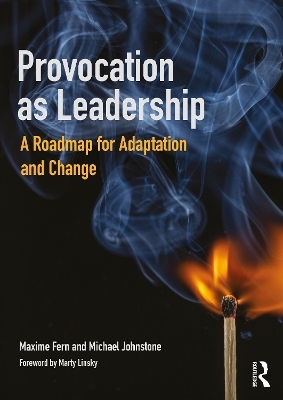
Provocation as Leadership
Routledge (Verlag)
978-1-032-34253-5 (ISBN)
To create deep change, you have to disturb people, or at least risk doing so. Shaking people out of their comfort zones not only generates the possibility of change but also elicits new information and brings out hidden resources that people need to navigate unfamiliar waters. Nevertheless, provoking without antagonizing or shutting people down and tolerating their pushback are complex challenges, requiring skill and will.
This is the first comprehensive provocation roadmap: why provocation is necessary for effectively leading change, the different forms of provocation, action tools and frameworks, and case studies illustrating how change is achieved through the sustained and careful use of provocation and disturbance, with strategies and tactics for minimizing the risks involved. We illustrate, for example, how two Australian farmers challenged centuries-old farming practice to regenerate their properties and how a large American bank used the death of a revered CEO to reinvigorate the business. We show how a young indigenous school principal tackled entrenched attitudes to turn a failing school around and how a national statistical service acted like a technology start-up to innovate during the Covid-19 pandemic. The case studies address change at the local level, within organizations, as well as on a national scale. We finish with a synthesis of the lessons learned and a set of ideas about building people’s capacity to use provocation to live, learn, and thrive.
Provocation as Leadership offers a blueprint for people who, using provocation, want to ignite change and help their organizations, group, or community break through to a better future. This book provides a vehicle to see provocation in its potential for necessary disturbance, to lay bare its anatomy, and give access to its possibilities, including how to enable provocateurs to live another day.
Maxime Fern, M.Ed. and Michael Johnstone, PhD., partners in life and work, trained in Psychology, Systems Family Therapy and Human Geography, developed the art of provocation as therapists and then leadership consultants. Stepping into places where others may be too polite to go, they refined provocation at Harvard’s Kennedy School as a framework to help others understand and succeed when change and adaptation is the only option. Both authors live in Australia and Italy.
Introduction PART 1: What is provocation and why is it necessary? 1. What is provocation? PART 2: Provocative capabilities and skills 2. Observation, interpretation, and questioning - foundation skills for provocation 3. Provocative capabilities 4. Developing a provocative mindset PART 3: Types of provocation 5. Paradox, contradiction, and ambiguity as provocation 6. Stories as provocation 7. Unique forms of provocation PART 4: Application - practicing provocation 8. Paradigm change - breaking with tradition in agriculture 9. Survival - Kibbutz Yizrael and the evolution of an ideology 10. Smashing it to bits - risky tactics to change first nations’ education 11. Living with contradictions - M&T Bank and the transformation battle 12. Confounding expectations - how a public sector business behaved like a start-up 13. Orchestrating conflict: Large-scale reform 14. Putting your head above the parapet - taking risks and speaking out 15. Testing your values - life transitions as personal provocation PART 5: Risks and lessons of provocation 16. Risks of provocation 17. Cultivating provocation - helping people live with disturbance 18. Lessons in the use of provocation 19. Epilogue - the albatross and the conductor
| Erscheinungsdatum | 24.11.2022 |
|---|---|
| Zusatzinfo | 11 Tables, black and white; 1 Line drawings, black and white; 1 Illustrations, black and white |
| Verlagsort | London |
| Sprache | englisch |
| Maße | 174 x 246 mm |
| Gewicht | 500 g |
| Themenwelt | Wirtschaft ► Betriebswirtschaft / Management ► Personalwesen |
| Wirtschaft ► Betriebswirtschaft / Management ► Planung / Organisation | |
| Wirtschaft ► Betriebswirtschaft / Management ► Unternehmensführung / Management | |
| Wirtschaft ► Volkswirtschaftslehre | |
| ISBN-10 | 1-032-34253-6 / 1032342536 |
| ISBN-13 | 978-1-032-34253-5 / 9781032342535 |
| Zustand | Neuware |
| Haben Sie eine Frage zum Produkt? |
aus dem Bereich


